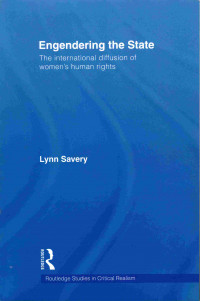
Text
Engendering The State: The international diffusion of women's human rights The international diffusion of women's human rights
Despite the post war existence of an international women's human rights regimen, it is only since 1970s, when there was a significant expansion and strengthening of this regimen, that norms of sexual non discrimination have had any effect .It has been acknowledged that in circumstances where a contextual understanding of human rights norms cannot be developed within a country or region, they have less chance of success (Cortell and Davis, 2000: 69;Keck and Sikkink, 1998: 204). However, outside of selective examples (Baldez, 2014), there has been little sys- tematic consideration of places where human rights mechanisms or norms have failed to take hold, or of how we might explain differential implementation (Savery, 2007). Furthermore, the case studies cited above have not asked why, in spite of the fact that human rights norms and ideas gained traction in civil society, this did not change formal policy or the behaviour of political institutions. While individual political parties are important, this case study suggests that the broader political structure in play is also key. This article has illustrated the 'gender biased corporate identity' of the Northern Irish state, and the ways in which formal politics can ignore or resist demands for change (Savery, 2007). While the majority of the literature considering women's international human rights mechanisms has stressed the importance inherent in norm translation and diffusion, the Northern Ireland case suggests that this is not enough to enact change. A welcoming local state structure, with a formal political arena which is open to considering women's issues is also necessary for substantive change to women's rights. In this sense, and following Savery (2007), this case study demonstrates that a stronger consideration of local political structures is necessary when addressing women's international human rights mechanisms. In Northern Irish women's activism, the engagement with CEDAW has meant that there has been an attempt to bypass local political structures
Availability
| KP.1.00062 | KP.1 SAV e | My Library | Available |
Detail Information
- Series Title
-
-
- Call Number
-
KP.1 SAV e
- Publisher
- USA : Routledge., 2007
- Collation
-
xiii, 277p. ; 24cm.
- Language
-
English
- ISBN/ISSN
-
978-0-415-42877-4.
- Classification
-
KP.1
- Content Type
-
-
- Media Type
-
-
- Carrier Type
-
-
- Edition
-
First, 2007
- Subject(s)
- Specific Detail Info
-
Rak kayu kaca
- Statement of Responsibility
-
-
Other version/related
No other version available
File Attachment
Comments
You must be logged in to post a comment
 Computer Science, Information & General Works
Computer Science, Information & General Works  Philosophy & Psychology
Philosophy & Psychology  Religion
Religion  Social Sciences
Social Sciences  Language
Language  Pure Science
Pure Science  Applied Sciences
Applied Sciences  Art & Recreation
Art & Recreation  Literature
Literature  History & Geography
History & Geography